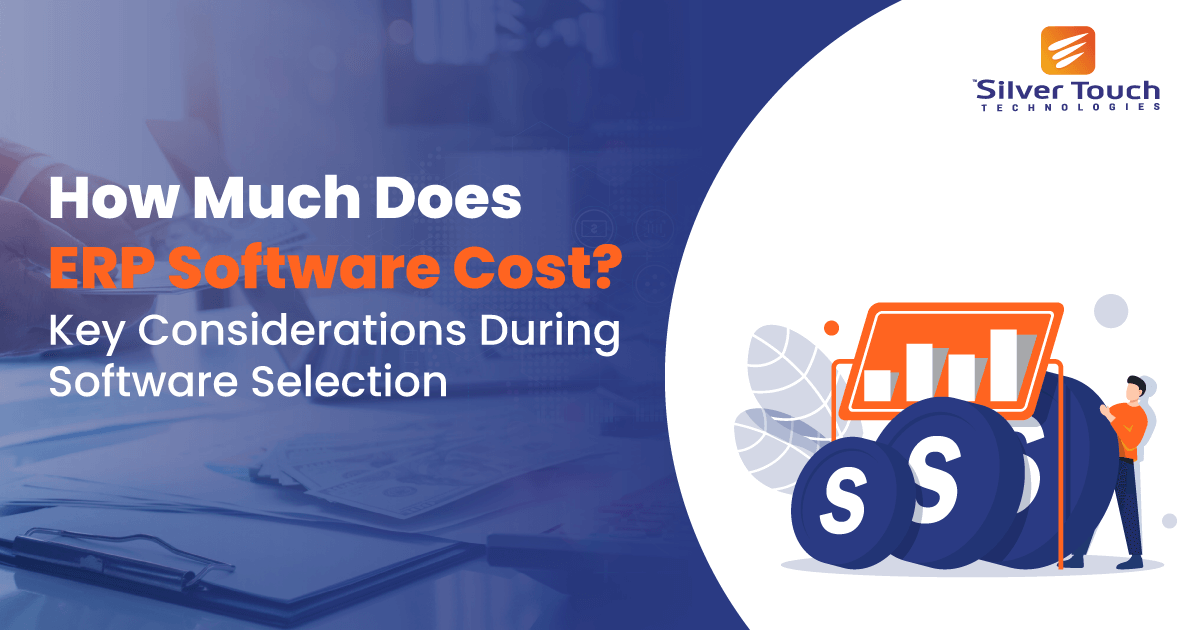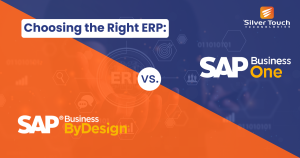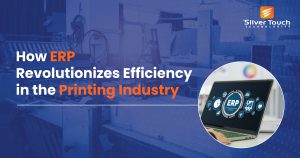ERP Implementation Cost – An Overview
Today SMEs, mid-sized businesses, and large enterprises need a robust ERP more than ever. ERP software solutions increase the efficacy of a company within days of implementation when done with the proper plan and expertise. But ERP implementation cost often worries the senior management, forcing them to step back. Contrary to popular belief, ERP implementation does not have to be costly if you know the cost components and choose the right implementation partner. This article gives you an in-depth view of ERP implementation, including factors affecting the cost, busting common misconceptions and more.
How Much Does a Typical Implementation Process Cost?
Ever wondered how much it costs to implement an ERP system? A report by SoftwarePath in 2022 revealed that the average ERP implementation cost begins at USD 9000. But is it the same for everyone? No. When you take into account various other factors, the cost rises. For a mid-level business, it can range between USD 150,000 and USD 750,000. Benchmarking the budget without looking into all the factors is difficult.
Factors Affecting ERP Implementation Cost
The cost of implementing an ERP system can be broken down into different elements based on the factors that influence it. There are eight common factors that you must consider.
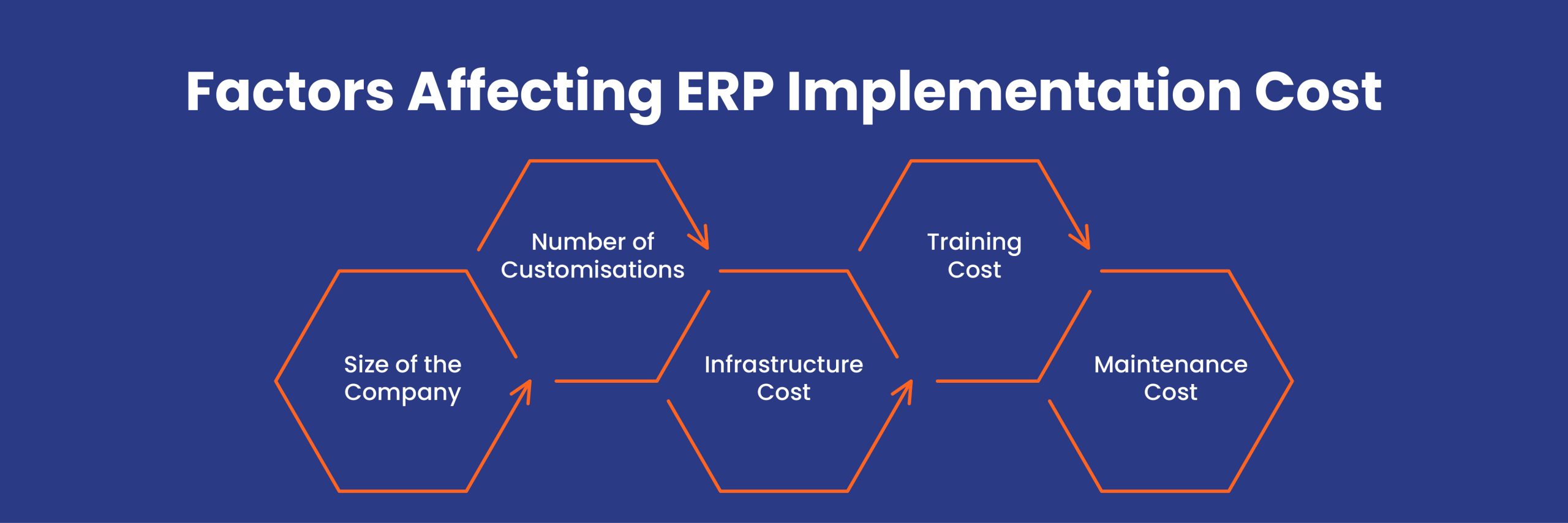
Size of the Company
This is the first and foremost contributor to the implementation costs. Several ERPs charge the client based on the number of users. The larger the company, the higher will be the ERP implementation cost.
Number of Customisations
Today, most ERPs offer maximum functionalities. However, you can tailor the capabilities based on particular requirements. The average cost of implementing ERP system will rise based on the number of customisations you choose.
Infrastructure Cost
Depending on the existing infrastructure, this cost will vary from company to company. The infrastructure cost comprises backups, storage, desktop computers, and server infrastructure.
Training Cost
Training the employees is an essential component that you must consider. It determines how well a program will work with your company’s needs. Many vendors offer training sessions, which will affect the ERP implementation cost if you opt for them.
Maintenance Cost
After the ERP is rolled out, it will need regular maintenance and updates to function properly. Therefore, consider the maintenance costs while determining the cost of ERP implementation.
You May Also Like to Read: SAP Business One Cost – A Complete Pricing Guide for SAP B1 License Cost in UK
The Cost of Implementing ERP Systems in Organisations
As a small business in the current business landscape, you will never run out of options while selecting an ERP software solution. Here is a list of six leading ERP solutions and the cost of implementing the ERP system.
Sage X3 ERP
This ERP is ideal for mid-sized and large organisations. It has numerous capabilities, including financial management, supply chain management, and CRM modules. Sage X3 is available as a SaaS solution as well as an on-premise ERP solution. The average ERP implementation cost of Sage X3 is USD 100,000.
Epicor Kinetic
Previously known as Epicor ERP, this business management tool is suitable for small emerging businesses to large multinationals across the world. It targets clients from the manufacturing industry and has features like manufacturing execution, financial management, supply chain management, etc. The minimum cost of ERP implementation is USD 50,000.
NetSuite
This is another dynamic, cloud-based ERP software designed for small and mid-sized companies. Its modules include supply chain management, CRM, and financial management. The minimum ERP implementation cost for NetSuite ERP is USD 10,000.
SAP Business One
SAP B1 is tailored for small businesses looking to leverage technology. Its features include financial management, supply chain management, business intelligence, and CRM modules. The average cost of SAP ERP implementation is USD 50,000.
Microsoft Dynamics
Microsoft Dynamics 365 is a member of the Microsoft Dynamics family of ERP software. This intelligent business management software caters to small and mid-sized businesses. It is packed with new-age tech capabilities such as predictive analytics and AI-driven insights. In this case, the average ERP implementation cost is USD 35,000.
Odoo ERP
Odoo is an on-demand open ERP. It is a comprehensive business management tool with an array of functionalities. It has two versions, namely, Open Source and Enterprise Editions. The cost of ERP implementation ranges between USD 10,000 and USD 1,00,000.
Want to Stay Ahead in the Competitive Market? Embrace ERP Implementation to Gain a Strategic Edge.

What are the Risks of ERP Implementation?
ERP implementation is not a cakewalk unless you plan it well. Did you know that the risks of ERP implementation can shoot up the average cost of implementing an ERP system? Here are five threats to a successful ERP implementation:
Inability to Redesign Business Processes
Once a new ERP is implemented across the organisation, inevitably, it will change the business’s operations. If the senior and mid-level management does not redesign the operational aspects, the ERP implementation will reap little to no results.
Lack of Data Integration
ERP implementation aims to have all the information on a unified platform. But data migration and integration from various Excel sheets, handwritten documents, and legacy systems is arduous. If not handled professionally, you can lose essential information.
Insufficient Reskilling and Training
The employees must be adequately trained to use the ERP system optimally. If not, the company will not benefit from the system.
Lack of Change Management
Resistance to change is common in all organisations. ERP projects often face resistance from employees. If the change management is poorly planned and employees refuse to adopt it, the ERP project will fail miserably.
Poor Technology Planning
Technology will play a vital role in ERP projects. Old and redundant systems or inadequate tech facilities will inhibit ERP implementation.
What are the Steps to ERP Implementation?
While every ERP implementation follows a different approach which alters its road map, there are six common steps in every ERP implementation. They are:
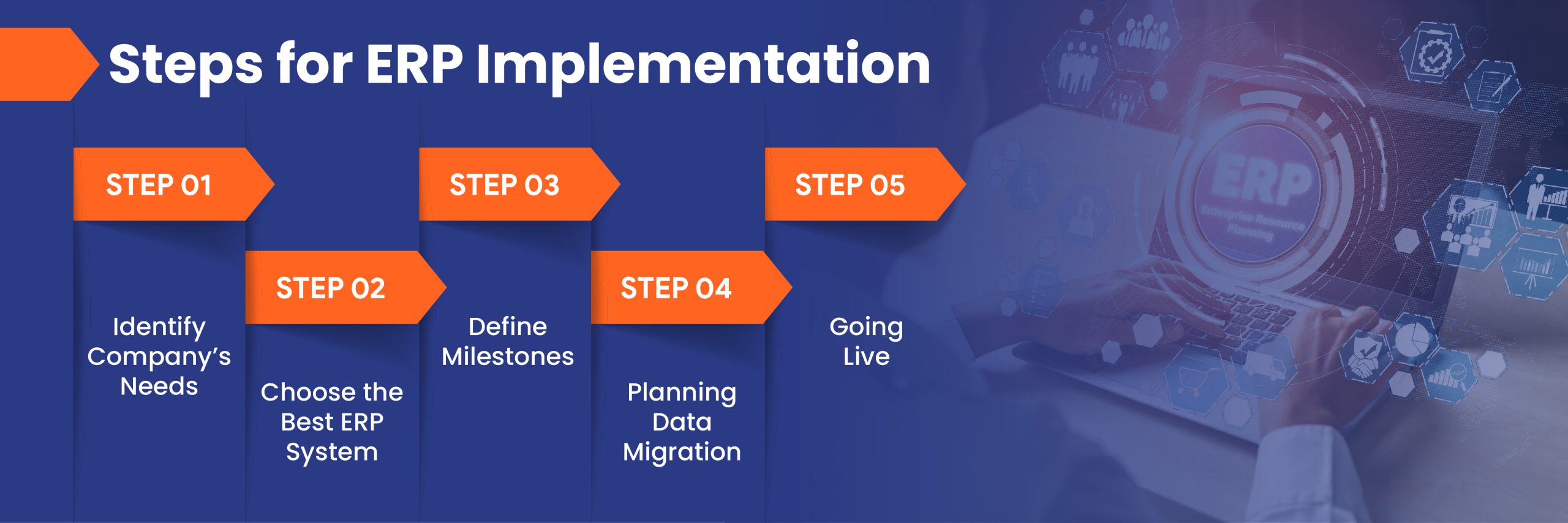
Identifying the Company’s Needs and Goals
First, you must determine the need for the ERP and what goals you want to achieve. This will give you a clear idea of what features the ERP must have.
Choosing the Best-Suited ERP System
There are several ERPs in the market. But which one do you need? Based on your goals, budget, and technical needs, select the ERP that is most suited for your company. The ERP vendor can help you in choosing the ERP.
Drawing a Sitemap and Defining Milestones
There are different approaches to implementing an ERP. Therefore, before configuring the solution, decide on a sitemap, number of customisations, deadlines and other milestones that will help keep the implementation on track. You can also determine the ERP implementation cost at this stage.
Planning Data Migration
If you do not have all the data on a unified platform, make sure to plan the data migration and integration. Ill-planned data transfer can lead to data loss. Testing the solution: Once the ERP system is configured and all the customisations are in place, the vendor will test the ERP. This will help in determining if there are any bugs or loopholes in the system.
Going Live
After doing the final corrections, the ERP system will finally be rolled out in the organisation.
What are the Different Approaches to ERP Implementation?
For successful ERP implementation, vendors follow different approaches based on your company’s requirements and several other factors. Commonly, there are four approaches to ERP implementation, namely:
Big Bang
No, this does not involve tech explosion. In the big bang approach or simply known as the single-step method, the entire business moves onto the new ERP solution.
Phased
As the name suggests, the ERP solution is rolled out in phases. Each phase of the project goes live at a different time. The features and tools are deployed in the organisation over an extended period.
Parallel
Sometimes, the company can choose to use the new ERP and old legacy system simultaneously for a specific length of time. This approach is known as the parallel method.
Hybrid
The hybrid model is a combination of the strategies mentioned above. In this case, you may roll out the core ERP modules using the big bang method. Later the additional modules for specific departments can be launched in phases. This approach can benefit small businesses with a tight budget or as and when they plan to scale up. The chosen approach will affect the cost of implementing an ERP system.
How Long does ERP Implementation Typically Take?
Unfortunately, there is no specific answer to this question. It depends on the factors affecting ERP implementation and the implementation approach you and the implementation partner choose. To ensure that the process is on track and resources are used optimally, it is vital to have a blueprint that will guide the operation.
Common Misconceptions about ERP Pricing
Are you struggling to decide if you should opt for an ERP solution? There might be some misconceptions about ERP solutions that are holding you back. We are busting some common myths in this article:
ERP is only for Large Organisations
Previously, it was believed that an ERP was only for large companies. But contrary to popular belief, the ERP solution is for everyone. There are special ERPs for small and mid-level industries, such as SAP Business One, Odoo, Epicor and more.
ERP Solutions are Expensive
Since several ERPs are in the market, their prices differ. Therefore all ERPs are not expensive. Rather they are competitively priced so that every business can implement them. You only have to incur initial ERP costs: ERP implementation costs are not limited to the initial set-up costs. You also have to bear the maintenance and upgrade cost for the ERP. All ERPs are priced the same: No! Every ERP has different license costs. This impacts the average ERP implementation cost. Some ERP prices are decided on the basis of a quote. Hence, ERPs are for businesses of all sizes.
ERP is non-negotiable:
ERP prices are not always fixed and can be negotiated with the dealer to get discounts or special offers.
How is Silver Touch Technologies the Best ERP Implementation Partner?
Finding the right ERP partner ensures a successful ERP implementation. Silver Touch Technologies Ltd has a pool of experienced ERP experts with vast industry experience. Our ERP consultants have assisted multiple organisations across several industries to choose the right ERP software and digitally transform the companies. Silver Touch Technologies Ltd offers end-to-end ERP services from ERP customisation to ERP implementation and support. Are you still wondering how much an ERP implementation costs? It is time to talk to experts! Contact our team today to avail the best ERP services.
Conclusion About ERP Implementation Cost
ERP is indispensable to modern organisations; you cannot scale up without it. Do not let the cost of ERP implementation hold you back. Talk to ERP experts at Silver Touch Technologies Ltd to find a solution that fits your budgets and your needs.

